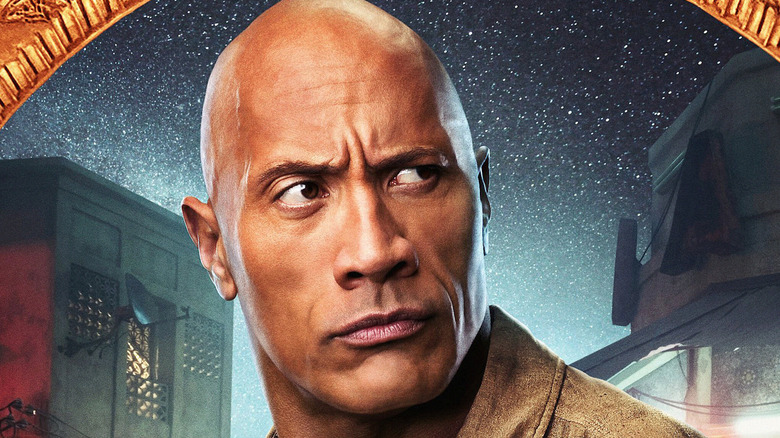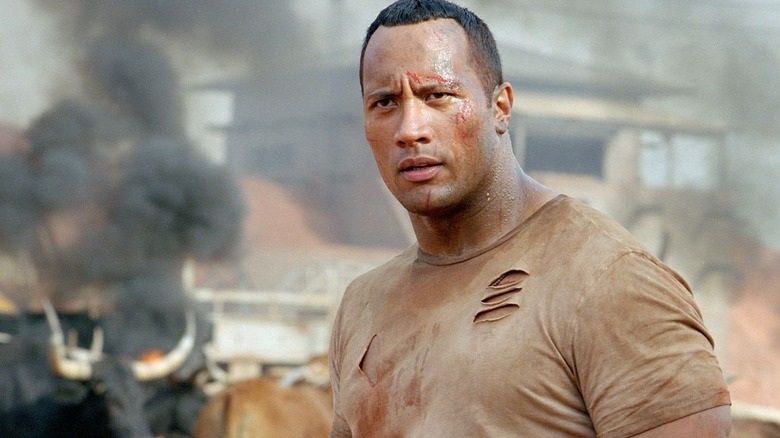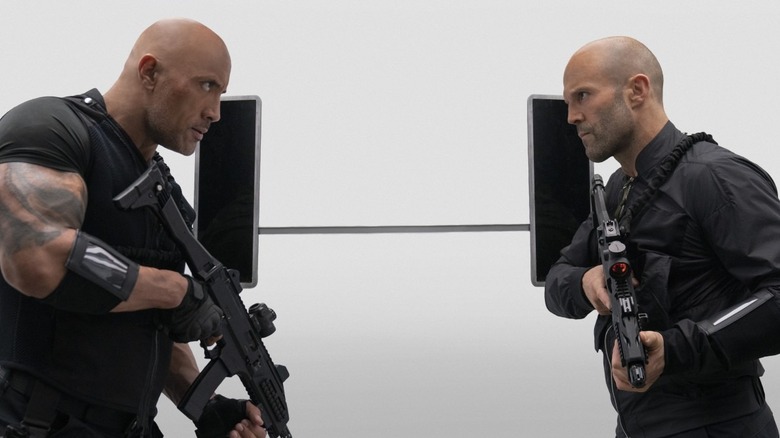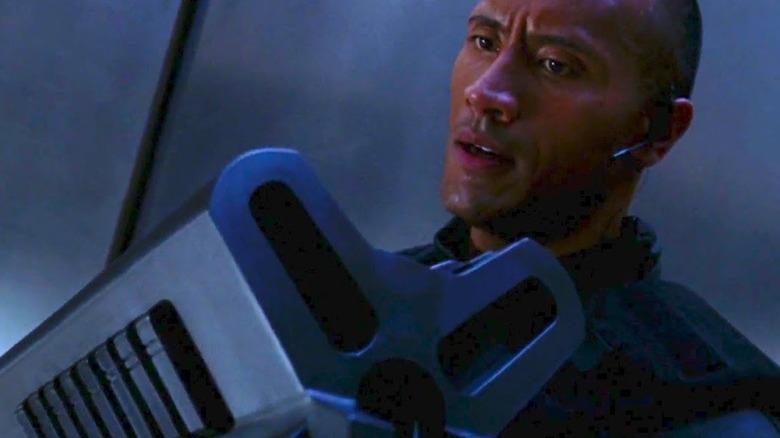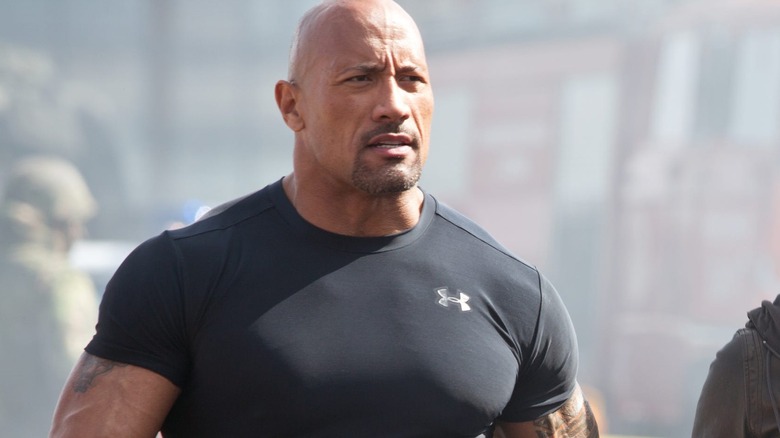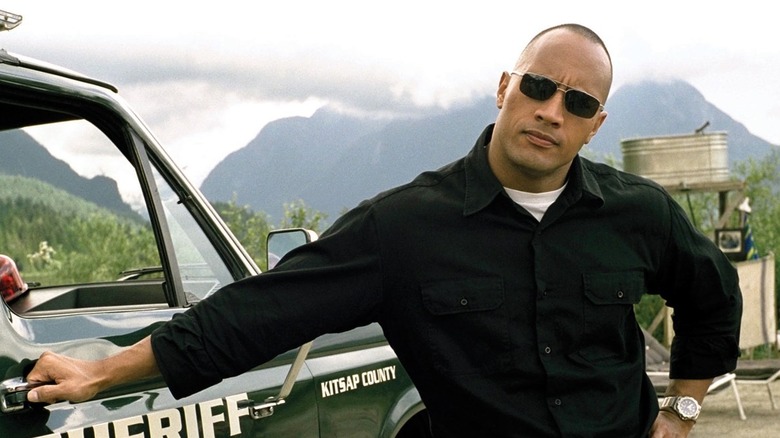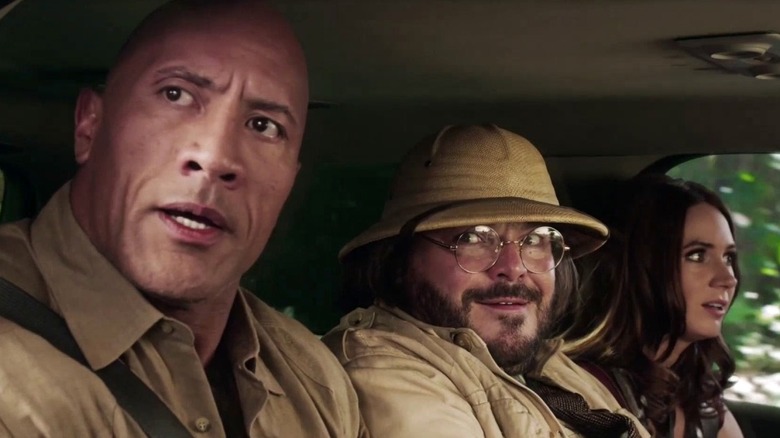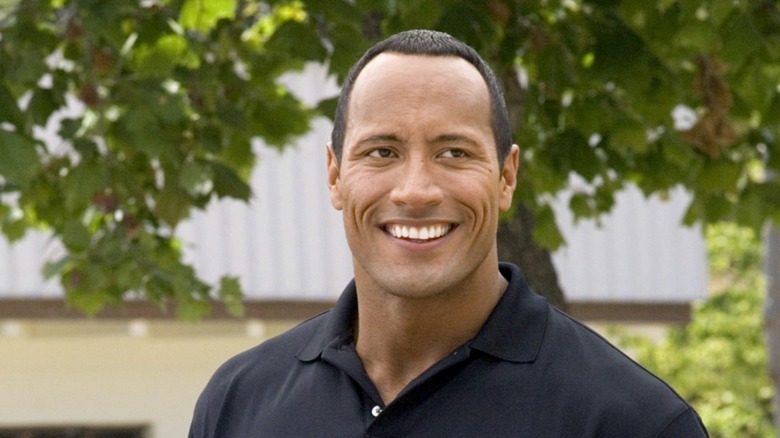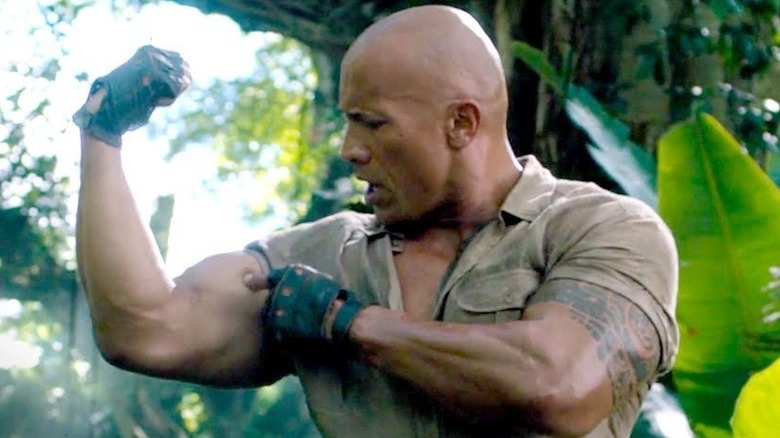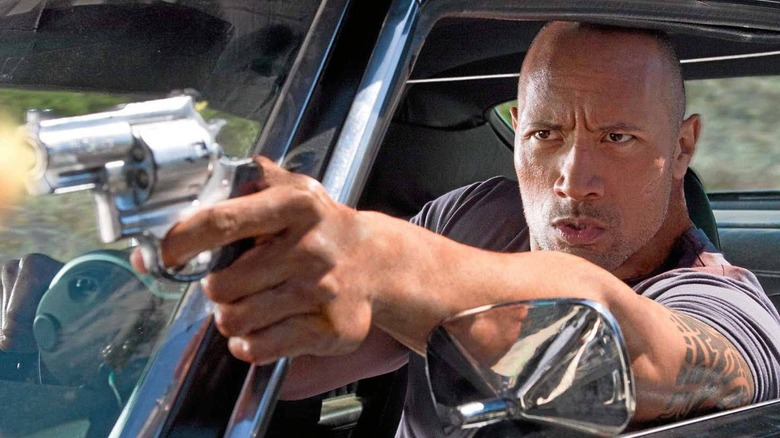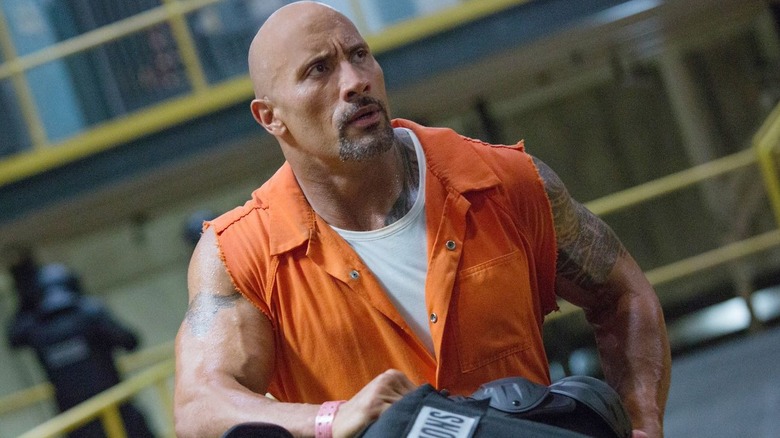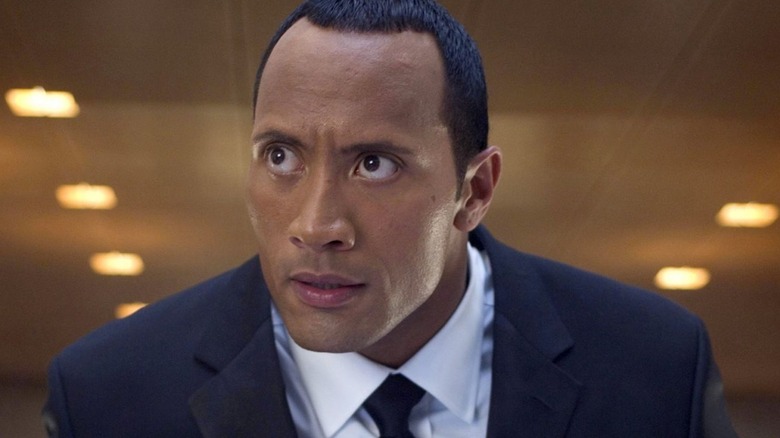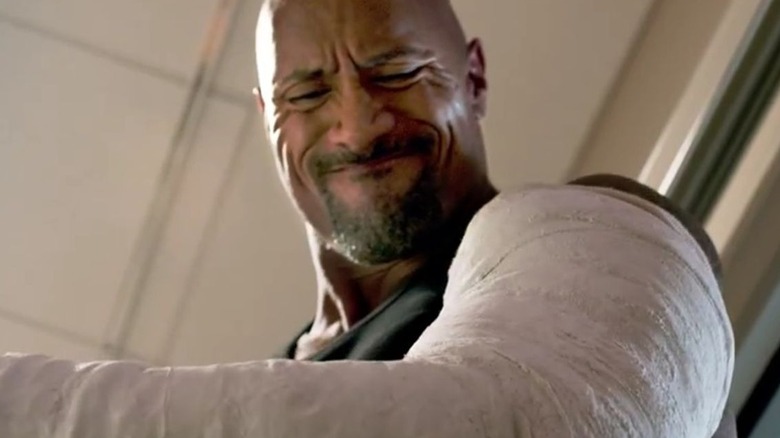Dwayne Johnson's Biggest Blockbusters And Biggest Bombs
Dwayne Johnson is the biggest movie star in the world. That's not hyperbole: For two years straight (2019 and 2020), Johnson was the world's highest-paid actor.
You may say: "Yeah, but his income isn't only from movies." But that just proves the point; the dude's charting his own course, becoming a brand unto himself and transforming what it means to be a celebrity. Yes, he's still one of Hollywood's most bankable movie stars, as people pay money to see him, not just him playing a character (e.g. Gal Gadot as Wonder Woman, Chris Hemsworth as Thor).
That's a small list, and pretty much only includes Johnson, Denzel Washington, and Leonardo DiCaprio at this point. All due respect to those other talented thespians, but nobody's buying Washington's tequila or DiCaprio's sports gear. However, the bulk of Johnson's bank account still comes from film. He earns it, with career box office earnings of $4.2 billion domestically and $12 billion worldwide, averaging $312 million worldwide. But while his nickname is The Rock, he's not unbreakable. Johnson has some blemishes on his record, especially from his early attempts at making the difficult jump from wrestling icon to movie star.
According to rule-of-thumb, a movie must earn twice its budget to be profitable (to cover marketing and distribution costs), so the rankings below include an estimate for how much Johnson's movies earned or lost, for context. However, the overall rankings are according to worldwide box office gross. The Rock may be President one day, so you'd better brush up on his history. Here are Dwayne Johnson's biggest blockbusters — as well as his biggest bombs.
Bomb: The Rundown
You couldn't ask for a more high-profile movie star debut than when Dwayne Johnson (at the time still billed as "The Rock" and sporting hair on his head) snagged the villain role in mega-sequel "The Mummy Returns." Despite being in the movie for less time than it takes to pronounce "Haku Machente" (not including the horrendous CG monster at the end), Johnson was a huge part of "The Mummy Returns'" marketing, leading to a $68 million opening and a $435 global haul. Johnson snagged $5.5 million for the prequel "The Scorpion King," beer and pizza money to him today, but at the time the highest-salary ever for a first-time leading man.
Johnson proved he was worth the investment, bringing in $165 million worldwide. Then, "The Rundown" happened, becoming for him what "Best Defense" was for Eddie Murphy — a head-scratching misstep in the middle of skyrocketing fame.
Honestly, "The Rundown" is a really solid action movie, with a 69% critics score (nice) on Rotten Tomatoes. However, by 2003 "one man army" action movies like those Arnold Schwarzenegger and Sylvester Stallone dominated in their heydays had been replaced by superheroes. So, the film's $80 million worldwide haul would have been pretty solid, had the film been crafted with a sensible budget. But with an $85 million price tag, "the underperformance of "The Rundown" nearly sent The Rock scrambling right back to the wrestling ring.
Hit: Hobbs & Shaw
"Fast & Furious Presents: Hobbs & Shaw" may have caused a rift with "the family," but it did pretty well for Johnson's bank account, and for Universal Pictures which bankrolled it. This spin-off from "The Fast & Furious" franchise was one of the few bright spots during the dismal summer box office of 2019, in which pretty much any movie not released by Disney underperformed at best ("Godzilla: King of the Monsters") or bombed at worst ("MIB: International", "X-Men – Dark Phoenix").
While it certainly helps being part of a franchise that has racked up $1.8 billion domestically and $6.5 worldwide, Johnson's global popularity played a huge part in the success of "Hobbs & Shaw." All due respect to Tyrese Gibson and Chris "Ludacris" Bridges, but it seems unlikely a "Pearch & Parker" film would do nearly as well (unless they spent the entire movie flying a Pontiac Fiero in space).
So, how well did "Hobbs & Shaw" do? With a mammoth $200 million budget ($20 million of which reportedly went to Johnson's wallet), "Hobbs & Shaw" opened to $60 million, on its way to $173 million domestically and $760 million worldwide. It's estimated that "Hobbs & Shaw" probably earned a tidy $360 million.
Bomb: Doom
The year 2005 was a time of transition for Johnson. The lukewarm box office response to action pics "The Rundown" and "Walking Tall" stalled his efforts at becoming the next Arnold Schwarzenegger. However, he hadn't yet launched his dreadful "macho guy in a kid's movie" phase ("Race To Witch Mountain", "Tooth Fairy"). In this muck was the appropriately titled "Doom." Appropriately titled because that's exactly what this movie met critically and commercially: Doom. With an 18% critics score and 34% audience score, the video game adaptation failed to transition from the console to the big screen.
But hey, nbd, video game movies are supposed to be bad, right? No, they're supposed to make money, whether they're good or not. "Doom" did not.
With a $70 million budget (which was a bad idea to begin with), "Doom" opened to a meager $15 million. Worse, it turned out to be front loaded, finishing its run with $28 million domestically and $58 million worldwide, so it likely lost around $82 million. Johnson was only a supporting actor (in a surprise "twist," he was killed early in the film) as "Doom" was ultimately Karl Urban's movie.
Nevertheless, The Rock's name and face were plastered all over the promotional materials, so whether he was in it for a few minutes or the whole runtime, people who went to see it did so because of him. But as the numbers show, not many did.
Hit: Fast and Furious 6
Dwayne Johnson's second appearance as Special Agent Luke Hobbs is one of the biggest hits on his resume. This was "Fast and Furious 6," btw, and if you have trouble remembering which "Furious" movie that was, it was the one where Hobbs hires Dominic and the family to take out a mercenary whose second in command is Letty (Michelle Rodriguez) in exchange for a full pardon. But while the specific details of the plot were forgettable (sorry, "Furious" fans), the numbers suggest you probably saw it at some point. Everybody else certainly did.
In 2013, "Fast and Furious 6" opened to $97 million, on its way to $238 million domestically and $789 million worldwide. On a $160 million budget, it is estimated to have made a profit around $469 million. Perhaps even more impressively, it was a 21% improvement over "Fast Five's" already massive $630 million.
You could be forgiven for thinking: "So what? Johnson just latched onto a popular franchise." Actually, it was kinda the other way around. While the "Furious" franchise had rebounded by the fourth film, Johnson's first "Furious" movie, "Fast Five," was already a huge 44% improvement over the "Fast & Furious'" take of $359 million. Johnson helped the "Furious" franchise level up in a big way, leading to his nickname: "Franchise Viagra."
Bomb: Walking Tall
Dwayne Johnson may have starred in "Walking Tall," but he certainly wasn't walking very tall at the box office. "The Rundown" had disappointed with $80 million worldwide (okay, but its budget deterred its profitability), showing there was a chip in The Rock's popularity — or at least his strategy of being the "next action hero."
Well, 2004's "Walking Tall" had a chance to fix that, casting Johnson as his generation's Joe Don Baker. It didn't. "Walking Tall" wasn't a course correction, so much as an even bigger detour than "The Rundown." That 2003 movie may have lost money, but at least it was good. "Walking Tall" got a dreadful 26% critics' score and a barely fresh 60% audience score. Its box office was even worse.
"Walking Tall" opened to $15 million, but only made $46 million domestically and an irrelevant $1.6 million internationally, for a global cume of $47 million worldwide. Given MGM spent $56 million on it, it can be estimated that "Walking Tall" lost about $65 million. Johnson's series of bombs showed while audiences were all in on him being an "added value" to the already popular "Mummy" series, they didn't see him as a movie star ... yet. He was still "the wrestler who acted," as evidenced by his continued billing as The Rock. But if he was going to "walk tall" for real, a change was clearly in order.
Hit: Jumanji: The Next Level
Both the "Fast and Furious" and "Jumanji" franchises are unique, because they started as successful, but not spectacular, box office performers, only to become major franchises later (in the case of "Jumanji," two decades later). What do the two franchises have in common? Dwayne Johnson. Johnson is as much a venture capitalist as he is a movie star; he finds undervalued properties with loads of potential, and invests that certain something to take them to "The Next Level" (pun intended). That certain something is ... well ... himself.
In which case, "Jumanji" might be more impressive than "Fast and Furious," which was already on an upswing, while "Jumanji" wasn't even a franchise before Johnson; it was a well-remembered Robin Williams star vehicle from 22 years earlier. Johnson turned it into a franchise. First, there was the performance of "Jumanji: Welcome To The Jungle," which could be dismissed as just counter-programming to the divisive "Star Wars: The Last Jedi" in 2017. But 2019's "Jumanji: The Next Level" proved this franchise was the real deal, earning $316 million domestically and $800 million worldwide.
Thanks to its modest (by blockbuster standards) $125 million budget, it can be estimated that "Jumanji: The Next Level" earned around $550 million. Skeptics may say: "Well, it just played as counter-programming to the equally divisive 'The Rise of Skywalker.'" Maybe ... but banking $800+ million twice proves a franchise is popular, no matter what it's up against.
Bomb: Gridiron Gang
By 2006, Dwayne Johnson's movie star career was off to a "rocky" start (sorry, not sorry). Actually, it was straight-up terrible.
"The Rundown," "Walking Tall," and "Doom," had each bombed, demonstrating moviegoers weren't looking for the "next" Schwarzenegger or Stallone, and even if they were, it wasn't Johnson. So what's a would-be macho, one-man-army movie star supposed to do? Give the audience the feels. Enter 2006's "Gridiron Gang," a "based on a true story" drama in which Johnson plays a probation officer and counselor at a juvenile detention center who teaches the inmates responsibility by forming a football team.
If it feels like you've seen this movie before, critics agreed, panning it as cliche with a 42% score. However, audiences dug it, with an 81% score ... they just didn't go see it. "Gridiron Gang" earned $38 million domestically and $41 million worldwide. Even with a modest $30 million budget, it lost about $19 million. However, it wasn't an utter defeat, as Johnson demonstrated acting chops that would serve him well down the road. Still, Hollywood doesn't give many second chances (let alone 3rd, 4th, and 5th), so Johnson was fortunate that movie studios and moviegoers still saw star power in him, even when his box office suggested otherwise.
Hit: Jumanji: Welcome To The Jungle
"Jumanji" was a well-regarded Robin Williams star vehicle that earned $262 million worldwide on a $65 million budget in 1995. An impressive $132 million profit, but not a blockbuster franchise launch. Nor was it meant to be. Sony Pictures tried to turn it into one (kinda) with "Zathura," a "Jumanji in space" pseudo-spin off/sequel that came without Williams, a clear connection to "Jumanji", or, y'know, any reason to exist, and bombed with $58 million worldwide in 2005. Shockingly, "Jumanji" came back in a big way 12 years later with "Jumanji: Welcome To The Jungle."
Sony wisely played it safe, only spending $90 million on the film (just slightly more than the "Zathura" budget of $65 million), and making sure "Jumanji" was front and center in the film's marketing. That, and plastering the stars' mugs all over the marketing, most notably that of Johnson. It turned out to be a good strategy. "Jumanji: Welcome To The Jungle" opened to $36 million, and legged it out to an incredible $404 million domestically (an 8.08 multiplier) and $961 million worldwide, a $781 million profit. Yup, somehow, someway, the "Jumanji" franchise went from a total bust to a nearly $1 billion franchise. This makes it not only one of Johnson's biggest hits, but the biggest franchise transformation ever.
Bomb: Faster
Dwayne Johnson's movie career was in a weird place in 2010. He'd headlined several action movie bombs, but found his new niche starring in "badass in a kid's movie" films like "The Game Plan," "Tooth Fairy" and "Race To Witch Mountain." Alas, those brought to mind Hulk Hogan's failed big screen career (such as the dreadful "Mr. Nanny"). Sure, they made a little money (and probably saved Johnson's movie career), but is that really the direction anyone would want to take their career? Certainly not Johnson, who tried again to headline an action flick in 2010's "Faster."
With a very modest $24 million budget, "Faster" was poised to make money, if only because it was so cheap to produce. Yeah, so much for that.
"Faster" tanked out of the gate with an $8.5 million opening weekend, and ran out of gas fast, earning $23 million domestically and $35 million worldwide. Despite its bargain budget, "Faster" still lost about $13 million. Back to kiddie movie hell for Johnson? Not quite. He followed this up with 2011's "Fast Five," which more than doubled the worldwide gross of "Faster," all in one weekend alone. Johnson's action movie career didn't need to go "Faster;" it just needed to go Faster and Furious-er.
Hit: The Fate of the Furious
For "The Fast and The Furious" franchise's eighth installment, the series did what nobody could have possibly predicted — it broke up the family! And Vin Diesel's Dominic "Dom" Toretto was the one to do it! Say what?!
Honestly, by this point the franchise could have done just about anything and still would have made boatloads of money. Or perhaps we should say "submarine loads" of money? (If you've seen it you'll get that joke). Well, after Dom fell into the seductive clutches of Charlize Theron's diabolical Cipher, there was only one man who could bring the family together to take on their former leader — Dwayne Johnson. Well, Luke Hobbs, but the two kind of blend together, honestly.
By this point Johnson was almost as much a part of this franchise as Diesel, as despite the large ensemble they were the only two featured on the teaser poster, with the provocative "Family No More" tagline. That was enough. "The Fate of the Furious" opened to $98 million, and wound up bringing home $225 million domestically and $1.2 billion worldwide. With a blockbuster-sized $250 million budget, "The Fate of the Furious" still hauled in about $700 million. While that's a slightly smaller profit margin than "Jumanji: Welcome To The Jungle," it gets the edge because it made $275 million more.
Bomb: Southland Tales
There are bombs, there are mega bombs, and then there's "Southland Tales." It's appropriate the film is about a potential nuclear annihilation, as that pretty much was the scale of this disaster.
Strangely, "Southland Tales" seemed like it might be just what Johnson's career needed in 2007 following a string of five failures, bookended by the successful "The Mummy" series and "The Game Plan." Most of Johnson's mid-2000s oeuvre was straight-to-DVD quality, so starring in critical darling Richard Kelly's highly-anticipated follow-up to "Donnie Darko" was probably meant to give him indie cred. So much for that.
While "Southland Tales" has recently received something of a critical reappraisal (especially the vaunted "Cannes Cut"), that has more to do with Johnson's career trajectory after the film. At the time nobody liked it, as its 39% critics score and 41% audience score demonstrated. Even worse was its box office gross. Ready for this? "Southland Tales" made $364,607 worldwide. Yep, probably less than what a Luke Hobbs' movie makes in one theater in Los Angeles on a Tuesday afternoon.
With a $17 million price tag, "Southland Tales" lost about $16.6 million. Sure, plenty of movies lost more money. Heck, plenty of Johnson's movies have lost more money, but that's ultimately a matter of scale. When it comes to flat-out failing to find an audience — any audience — "Southland Tales" has few equals.
Hit: Furious 7
Few franchises have followed a more interesting trajectory than "The Fast and The Furious." The series started strong in 2001, hit the skids, then roared back not only bigger than before, but much bigger. Like "Marvel," "Star Wars," and "Jurassic Park" big. To give you an idea of how unusual that is, imagine if other 2001 hits like "Lara Croft: Tomb Raider" or "Spy Kids" launched multi-film, multi-billion dollar mega franchises 14 years after the original. How does that happen? Easy, Dwayne Johnson's Luke Hobbs, who changed the franchise forever with 2011's "Fast Five." The series' high water mark, however, came with 2015's "Furious 7."
You could tell this film was meant for big things when it opened to $147 million domestically, a 35% / $50 million bump from the $97 million opening of "Fast and Furious 6." "Furious 7" wasn't done smashing franchise records, earning $353 million domestically and $1.5 billion worldwide, nearly doubling the $789 million worldwide gross of "Furious 6."
"Furious 7" became one of the top ten highest-grossing films ever, bolstered by one of the top four biggest international grosses ever (behind only "Avatar," "Avengers: Endgame" and "Titanic"). With a $190 million budget, "Furious 7" earned Universal a profit of around $1.12 billion. "Furious 7" is unequivocally Johnson's biggest hit, handily topping the $781 million profit of "Jumanji: Welcome To The Jungle" and $1.2 billion gross of "Fate of the Furious." Not bad for a pro wrestler turned actor, right?
